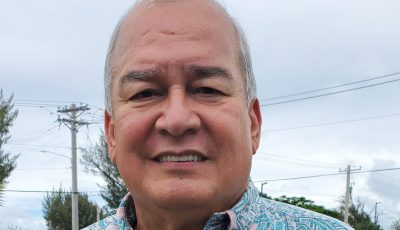Ex-Army recruiter said he underwent polygraph test sans reading of his rights
Jordan M. Jucutan, a teacher and a former member of the U.S. Army Reserves, said agents from the Army Reserve Criminal Investigation Division and the Federal Bureau of Investigation, interrogated him and subjected him to a polygraph test without advising him of his constitutional rights.
Jucutan is facing charges in federal court for allegedly stealing referral bonuses from the U.S. Army Reserves totaling $9,000 by fraudulently claiming that he recruited five potential soldiers and claiming the cash incentives for himself.
A superseding indictment charged Jucutan with three counts of wire fraud and three counts of aggravated identity theft.
In his declaration filed Tuesday in the U.S. District Court for the NMI, Jucutan said every time he attempted to explain that he hadn’t stolen anyone’s personal identification information, a certain special agent and polygraph test administrator surnamed Smith would only yell at him and say “answer the question!”
“By this point, I was so panicked, confused and agitated that I think I would have answered yes to anything even to being at the assassination of President Kennedy even though I wasn’t even born then,” he said.
Attorney Pamela Brown Blackburn, counsel for Jucutan, attached the declaration in support of defendant’s motion to suppress confession and all prior statements made in March 2015.
Blackburn asked the court to suppress Jucutan’s statement to Army Reserve CID investigators on March 31, 2015, as well as all prior statements made during CIB and FBI interrogation at the FBI office on Saipan on March 5, 2015, due to violation of defendant’s U.S. and NMI constitutional rights as guaranteed under the 5th and 6th Amendments.
Blackburn asserted that the court should grant the motion to suppress Jucutan’s confession as an involuntary under both U.S. Supreme Court and U.S. Court of Appeal for the Ninth Circuit case law interpreting the U.S. Constitution, Fifth Amendment protections against self-incrimination.
In his declaration, Jucutan said that, on March 5, 2015, at 1:15pm, he was called out of his classroom to the office of vice principal, where three plainclothes men met him.
He said one of the men was a certain special agent Kimrey with the U.S. Army.
Jucutan said Kimrey requested if he could go to the FBI at 4pm that day so they could talk to him.
Jucutan said Kimrey sounded relaxed and pleasant so he responded in the affirmative.
He said inside the FBI’s conference room, Kimrey and an FBI agent were there.
He said the FBI agent stated that it was just an interview since his name appeared on a list that they had so “you don’t really need a lawyer.”
Jucutan said Kimrey later began questioning him about his recruiter and service in the Army Reserves.
He said Kimrey and the FBI agent later kept questioning him about $17,000 that they said he had gotten and that all he could repeat was he couldn’t remember.
He said the interview lasted two hours.
Jucutan said a few days later, Kimrey called and informed him that the polygraph test for him was scheduled for March 31, 2015, at the FBI’s office.
Jucutan said once he was wired up and told by special agent Smith not to move and has his head, arms, and legs constrained in the chair, he became extremely nervous which resulted in him getting more confused with his heart racing and heavily perspiring.
Jucutan said he became so confused and conflicted that by the time Smith began asking questions, he was incapable of simply answering “yes” or “no” but had to take long pauses to attempt to remember what really happened during his time as a recruiting assistant with the Army Recruiting Program which was six or nine years prior to the polygraph testing.
Jucutan said when Smith told him about the need to have many tests as he had not “passed” the prior tests that caused him to become more agitated, confused, and “created a state of mind which I can only describe as being in a tunnel.”
Jucutan said as Smith asked more questions he later began crying because it was all too much and stated that he only did it, meaning joined the Army Recruiting Program system as a recruiting assistant, to get extra money because his wife was pregnant with their first child.
“I then broke down, sobbing since I realized that I was set up and should never allowed the agents to convince me to not worry since I was not the target of a criminal investigation but instead should have invoked my constitutional rights which I believed it was too late to do,” he said.
Jucutan said during the six hours at the FBI’s office, he never left the polygraph room during the occasional breaks nor was he offered food or water or the use of the restroom either by the CID or FBI agents.



























